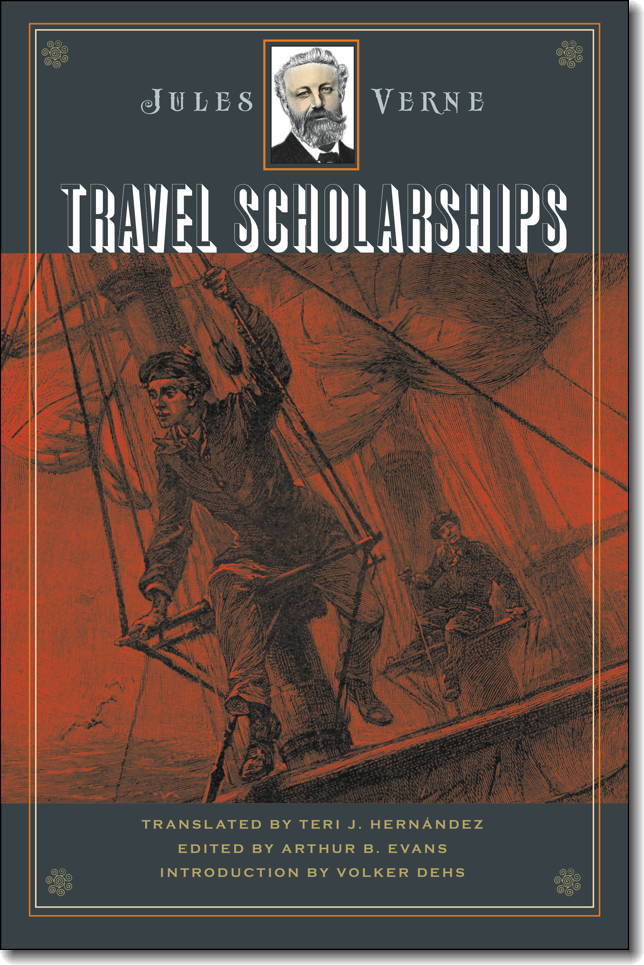Travel Scholarships
Travelling Scholarship
Scholarships For Travel
Bourses de voyage (1903)
This is the last of Verne’s Extraordinary Voyages to
be translated into English.
Member Andrew Nash’s website contains all the English variations of this title.Plot Synopsis:
(courtesy of member Dennis Kytasaari’s - website)
Nine laureates of the Antillean School are awarded scholarships, which their benefactor, Mrs. Kathleen Seymour of Barbados, wants them to use for a trip to visit the islands known as the Antilles. With three hundred and fifty islands in this region, the voyage will be limited to the Windward Islands where the students were born, including the English islands of Saint Lucia, Dominica, and Antigua; the French islands of Guadeloupe and Martinique; the Danish islands of Saint Thomas and Saint Croix; the Swedish island of Saint Barthélemy; and Saint Martin, owned half by the Netherlands and the other half by France. Accompanying the young men on this trip is the school’s Latin phrase spouting bookkeeper, Mr. Patterson. The journey across the Atlantic begins, but unfortunately for them, the ship they’ve been traveling upon, the Alert was commandeered by a group of criminals who had initially planned on dispatching the boys early into the voyage. The pirates decide to keep them alive when they learn the students will be receiving 700£ each when their tour of the island reaches the final island of Barbados. For the pirates to be able to complete their mission they will have not be caught and for the students to survive they need to discover the true identities of the Alert’s crew.
Review(s)
Travel Scholarships (Early Classics of Science Fiction)
Translator: Teri Hernández. Introduction: Volker Dehs. Editor: Arthur Evans.
Middletown, CT, Wesleyan University Press, 2013. 424 pages, ?? ill.
Hardcover — ISBN-10: 0819565121, ISBN-13: 978-0819565129
Verne’s British publisher, Sampson Low, essentially abandoned him in the last
years of his life, and several of his late-career novels weren’t translated
into our language. As he’d always done, Verne rotated genres from book to
book; his newest achievements in science fiction, adventure, and intrigue came out
successively in French editions, but it made no difference - Sampson Low gave them
all the cold shoulder, and English versions were delayed for decades … sometimes,
as with “Travel Scholarships,” for more than a century. Why the snub?
My guess is administrative shakeups and belt tightening. But in any case, as Wesleyan
editor Arthur B. Evans acknowledges in his preface, “The exact historical
reasons are difficult to discern.”
It was a shame nonetheless. Even in his seventies Verne was the craftiest of old
pros, a tale spinner with a huge bag of tricks, and “Travel Scholarships”
shows him in solid form with one of his specialties. Published in Paris in 1903,
this is the last holdout among his untranslated novels, and it’s one of Verne’s
slickest, shrewdest sea stories. The yarn is laid in the 1870s and begins in the
British Isles: escaped convicts hijack a charter cruise bound for the West Indies.
The vessel’s passengers are nine lads ready to come of age, student winners
of a summer trip to select islands in the Antilles; their adult protector is the
school’s bean-counting bursar. The runaway thugs scheme to murder them all,
plunder their scholarship money, and lead a life of piracy in the Pacific; but they
need to move cautiously, playacting as good guys and able seamen.
Verne was a yachtsman for much of his adult life, so his sailing scenes have color
and authority, plus he mixes in a variety of other attention-getting ingredients:
low comedy, plot twists, word games, fascinating factoids, mysteries that keep piling
up - all of it leading to a scary open-boat journey and a ferocious climax in the
mid-Atlantic. Yet, though his overall tone is upbeat and theatrical, there are undercurrents.
One ethical issue here often rears up in Verne’s fiction, his longstanding
hostility to colonialism, and this little-known tale features one of his slyest
pieces of dramatized satire: students from Britain and France squabble (p. 222)
over which of their nations owns the isle of Saint Lucia in the Lesser Antilles.
Their verbal ping-pong (wittily caught by the translation) is a cagey metaphor for
the back-and-forth fortunes of this island, which changed hands countless times
between the two old rivals.
A second undercurrent seems downright subversive on Verne’s part. His ship
is a miniature cosmos: though their roots are multinational, the students manage
to coexist peacefully despite their inept protector, the school’s bursar.
The latter’s problems are psychiatric: like other obsessive-compulsives in
Verne’s stories (Otto Lidenbrock, Inspector Fix, Keraban, etc.), the bursar
gets hopelessly seasick. Worse, he faints at the sight of a stuffed snake, is catatonic
in a crisis, and needs the students to take care of HIM, rather than vice-versa.
And yet - think about this - the bursar is the novel’s adult authority figure
…
“Travel Scholarships” is the 31st volume in Wesleyan’s series
Early Classics of Science Fiction, also the last of four Verne novels that didn’t
appear in English till this publisher took charge. As edited by Evans, the translation
by Teri J. Hernandez is an easy read, often catches Verne’s humor, and rises
to real thrills in the stormy climax. Like other titles in the series, this is a
seven-course critical edition - it has an introduction by overseas Verne scholar
Volker Dehs, 30-plus pages of provocative endnotes, a succinct biography of Verne,
an up-to-the-minute bibliography, and all the wash drawings and photos from the
original French edition.
Verdict: a stirring sea story with literal depth … also splendid
accessories, a quality cloth binding, and a startlingly reasonable price. Click
on that yellow bar up there to the right (on Amazon website).
 © 1993 - 2025 North American Jules Verne Society, Inc. — a 501(c)(3) Corporation
© 1993 - 2025 North American Jules Verne Society, Inc. — a 501(c)(3) Corporation
